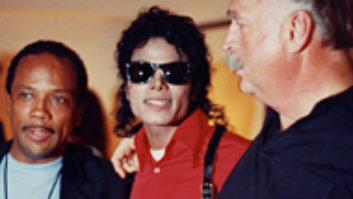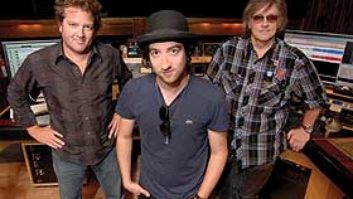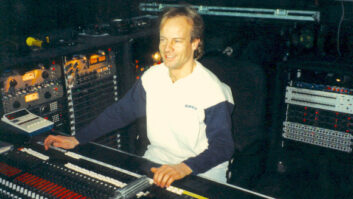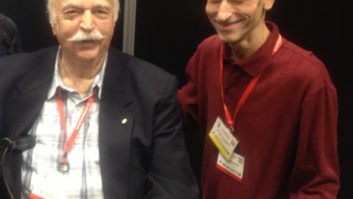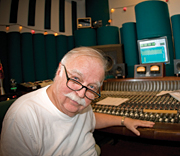
Photo: Kent Weakley
You just produced
Road With No Signs,
the debut CD from Garneau, a band featuring teenage virtuoso brothers Jordan and Josh Garneau, backed by top session players. How did this come about?
It started out as a demo for the band to get gigs. It was instantly apparent to me that this was a unique thing. I told them we had to turn this into an album, which I think scared them a little. [Laughs] All you have to do is listen to “New York State of Mind” to show how carefully they did their homework. And Dave Waller — the vocalist on the album — can sing his ass off. You should hear these guys play live in the studio. Jordy — the guitar player — is like working with a superexperienced musician, yet he’s only 17. And [drummer] Josh can play a groove! To me, that’s the name of the game, because so many of the records I’m famous for are groove records and Josh is really great. Both he and Jordy are so good — and they’re right here, from Ocala!
Is that the secret to being discovered by Bruce Swedien?
No, in fact it was the other way around. They discovered me. I love that!
So with this project you finally got your start in the music business?
[Laughs] Not exactly. It was Quincy Jones back in 1958. He came into [Bill Putnam’s] Universal Recording Studios in Chicago and we’ve been having a ball ever since. I remember that day like it was yesterday. I was out in front of Universal on 46 E. Walton Street, and this taxicab pulled up. Out popped this great-looking young dude with a couple of gorgeous young ladies on his arms. We went in the elevator, and I told him, “Quincy, I’m Bruce Swedien, and we’re gonna be working together today.” The first session was Dinah Washington. That’s how we first met and it was like it had to be. He’s the most knowledgeable person about music on Earth, and everything I’ve learned about the esoterics of popular music I learned from Quincy Jones. It’s all about quality and doing the best you can with the project at hand. In essence, I went to the University of Quincy Jones.
So this has definitely been a transition for you, going from engineer to producer — the one who calls all the shots.
I don’t do things any different now than I ever did. Because starting with Quincy, the people I’d worked with all along relied on me in the production of the album. While I didn’t always get credit, I’ve always been paid like a producer, with royalties and all. It ended up not being a transition at all. It’s all about the music. Every project I do sounds different, and I bring a piece of myself to every project, especially this great record with the Garneau band.
Did you track one instrument at a time or rehearse a rhythm section?
We did them one at a time. I usually work that way. I don’t normally go for a sound and then imprint it on the project. It’s usually controlled by the music at hand and I look for sonic inspiration in the compositions.
Was the band involved in the mix?
Actually, mixing is not just a phase of the project for me. I start the mix during the tracking sessions and continue building on whatever sonic values show up early in the production that I fall in love with.
Do you have any advice for someone learning the craft?
I have a couple short sayings that students seem to enjoy. A lot of people get really wrapped up in the nuts and bolts about how we record and forget about the basic value that music has to be a moving experience — especially recorded music. People don’t care how the music is made, but only that it moves them.
How important is a formal audio education?
It’s very important, but a lot of young people today don’t have any real opportunities to hear good music in a live acoustical situation, which to me is the best ear training.
Do you have any more advice to offer?
It’s much easier to be done than to be satisfied.
Doesn’t that apply to a lot of things in life?
I think so, but it really applies to mixing.
For more information about Garneau, visit
www.garneauband.com. And as if Bruce Swedien needed more to do, he recently completed a book called Recording Michael Jackson, which chronicles his experiences working with the King of Pop. It’s due out early next year from Hal Leonard Publishing.
